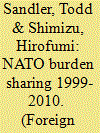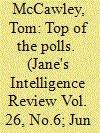|
|
|
Sort Order |
|
|
|
Items / Page
|
|
|
|
|
|
|
| Srl | Item |
| 1 |
ID:
099168


|
|
|
|
|
| Publication |
2010.
|
| Summary/Abstract |
One of the ground-breaking features of the World Trade Organization (WTO) Agreement on Trade-Related Aspects of Intellectual Property Rights (TRIPS) is its part III on the enforcement of intellectual property (IP) rights. In early 2009, the first WTO Dispute Settlement Panel Report primarily addressed obligations on IP enforcement. Here, the technical success of the US border measures claim comes with a crucial limitation: those Chinese measures that cover basically all of the commercially relevant activity are ab initio excluded from the panel's findings. Because they go beyond the minimum standards of TRIPS, the panel relied on one of the few TRIPS provisions that specify the relevance of TRIPS for additional "TRIPS-Plus" IP protection and enforcement. Given that such "TRIPS-Plus" measures are increasingly common in national laws and international treaties, it is time to take a closer look at how TRIPS addresses TRIPS-Plus IP protection. With a focus on border measures, I conclude that TRIPS contains not only minimum but also maximum standards or "ceilings" that impose limits on additional IP protection and enforcement. Such ceilings in TRIPS can function as limits for further extensions of IP protection and enforcement-as currently negotiated under a proposed Anti-Counterfeiting Trade Agreement or relating to border measures against generic drugs in transit.
|
|
|
|
|
|
|
|
|
|
|
|
|
|
|
|
| 2 |
ID:
121877


|
|
|
|
|
| Publication |
2013.
|
| Summary/Abstract |
This article explores the involvement of a range of diverse for-profit actors in providing port and border security in Indonesia. Using the port of Belawan, Medan, as a case study, the article demonstrates the critical, albeit controversial, role that private security providers play in security governance in Indonesia. After a discussion of port security and the notion of ports as borders, the paper provides an overview of the large number of state and non-state actors involved in providing security in the port of Belawan. Among the for-profit actors are guards hired by the state-owned port operator Pelindo I; Private Military and Security Companies (PMSCs) with links to the Indonesian military; and members of Pemuda Pancasila (PP), known to be involved in illegal activities in the port they help secure. The article argues that while some private actors do contribute to port security, the involvement of so many different types of state and non-state agencies has actually lessened security in Belawan. This is in part due to the nature of some of the agents involved - particularly the members of PP - and the problematic relationship and lack of cooperation between the different state and non-state actors.
|
|
|
|
|
|
|
|
|
|
|
|
|
|
|
|
| 3 |
ID:
131055


|
|
|
|
|
| Publication |
2014.
|
| Summary/Abstract |
Motivated by US Secretary of Defense Robert Gates' farewell address to NATO, this article investigates whether NATO burden-sharing behavior has changed during the last ten years. Based on a Spearman rank correlation test, we find almost no evidence that the rich NATO allies shouldered the defense-spending burden of the poor allies during 1999-2009. In 2010, there is the first evidence of the exploitation of the rich. When allies' defense burdens are related to defense benefit proxies, a Wilcoxon test finds that there is no concordance between burdens and benefits after 2002. This is indicative of a less cohesive alliance, in which allies are not underwriting their derived benefits. We also find that allies' benefits, which are tied to their exposed border protection and terrorism risk, motivate defense spending. Allies' benefits, based on economic base and population, are less of a driver of defense spending for most NATO allies. We devise a broad-based security expenditure burden that accounts for defense spending, UN peacekeeping, and overseas foreign assistance. In terms of this security burden, there is evidence of the exploitation of the rich by the poor beginning in 2004. Our findings indicate a two-tiered alliance that faces significant policy challenges.
|
|
|
|
|
|
|
|
|
|
|
|
|
|
|
|
| 4 |
ID:
176234


|
|
|
|
|
| Summary/Abstract |
The decline in the smuggling of people from Indonesia to Australia since late 2013 is primarily attributable to unilateral deterrence policies under Australia's Operation Sovereign Borders. When seeking to prevent asylum seekers from coming to Australia to enjoy the right to asylum there, the Australian government has tested a number of deterrent mechanisms that sometimes border on illegality and even state crime. In May 2015, for example, Australian authorities intercepted an Indonesian boat carrying 65 asylum seekers and allegedly paid the six smugglers to return their passengers to Indonesia. In this article, we reconstruct what happened at sea, and put forward a number of arguments that categorise this ‘turnback’ as explicitly-commissioned people smuggling against Indonesia. Our article also points to further implications about looming risks if the policy was to be employed more widely by states in other areas of the world where people cross the sea to seek asylum. Not only would the practice severely undermine international collaborations that have developed to prevent and combat people smuggling, but it would also create additional safety risks for those who are turned back.
|
|
|
|
|
|
|
|
|
|
|
|
|
|
|
|
| 5 |
ID:
182143


|
|
|
|
|
| Summary/Abstract |
In the present geopolitical melee, the tools of strategic coercion and conflicts are finding new ways to achieve the desired end. The need today is to restructure and reshape a ‘big war military with smart, lean, agile and combined arms joint warfare smart capabilities’. India’s military strategy must focus on ‘offensive domination with maneuver warfare orientation rather than attritionist ground holding mindsets. The restructuring philosophy will accordingly need to focus on a ‘capability-based approach with deterrence based on denial’. The operational need is to move from large bulky formations to modular technology-enabled networked Brigades and Divisional sized Integrated Battle Groups (IBGs). The challenge is to restructure in an institutionalized time-bound manner that is neither too much too soon nor too little too late.
|
|
|
|
|
|
|
|
|
|
|
|
|
|
|
|
| 6 |
ID:
131214


|
|
|
|
|
|
|
|